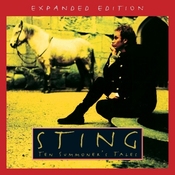Ten Summoner's Tales
- If I Ever Lose My Faith In You lyrics
- Love Is Stronger Than Justice (The Munificent Seven) lyrics
- Fields Of Gold lyrics
- Heavy Cloud No Rain lyrics
- She's Too Good For Me lyrics
- Seven Days lyrics
- Saint Augustine In Hell lyrics
- It's Probably Me lyrics
- Everybody Laughed But You lyrics
- Shape Of My Heart lyrics
- Something The Boy Said lyrics
- Nothing 'Bout Me lyrics

Soundbites
"In 1992 we moved the family out to the country, to a run down manor house built in the sixteenth century that needed some care and attention. The gardens were beautiful, and walking in them was like walking into a dream. It was called Lake House. I felt inspired to write, and, for the first time in years, with a genuine spirit of happiness. There were no grand concepts, no plan, except to have fun telling stories in as many diverse styles and moods as I could think of. It is this carefree spirit that pervades the album and helped it to become one of my most popular records. The title was a mischievous conceit linking my surname, Sumner, with the scurrilous character in Geofffrey Chaucer's Canterbury Tales. There was nothing more to it than that, and subtitling the first and last songs 'Prologue' and 'Epilogue' was just further mischief. The album artwork does include the first picture of me with a lute, something that would become significant to me in the years to follow."
Sting, 'Lyrics', 10/07
"The title is a mild literary joke because my name, Sumner, comes from the medieval name Summoner and a Summoner was someone who summoned you to court or to see the king. The Canterbury Tales which was written by Geoffrey Chaucer in the fifteenth century is a collection of stories told by a group of pilgrims - there's a nun, a miller, a knight, a summoner, a pardoner and they each tell a story. They each tell a story and their all kinds of stories - romantic stories, funny stories, rude stories and they are all told in different styles. It's a kind of ragbag. So I thought there was a connection, because the album is essentially a ragbag of styles - it comes from everywhere and the only thing that connects it is me. So I thought of my connection with this name Summoner and with the album being an eclectic ragbag of tunes I'll call it 'Ten Summoner's Tales'."
Sting, 'Ten Summoner's Tales' Promotional Interview Disc, '93
"By the time I made 'Ten Summoner's Tales', that was about having a steady band that I loved and trusted, and having a nice family life. I'd moved here (to Lake House). I fell in love with the cliché of moving into a country mansion, which I'd avoided for years. It was all of those factors, and just having a ball."
Sting, Mojo, 2/95
"I didn't want any more confessional songs, and I wanted to put myself in other scenarios. I can do that, I'm a craftsman. I don't have to just do one thing. It was a good release for me. But now I don't know what to do next that's the problem. I don't know whether to go back to the doom and gloom. I'll have to sit and wait and see what happens. I've no plans."
Sting, Mojo, 2/95
"On this album, I've looked around at the most normal things in my life: the cowboy movie on my TV, the golden fields of barley beyond my house, and tried to see the subtle stories within them. Yet on the record's final song, 'Epilogue (Nothing 'Bout Me)', I say you can search all and still not know anything about me, the storyteller. But maybe that's not true, because being whimsical is an essential part of my personality and my own searching. I want to be a good pilgrim on the road to Canterbury, but I want to ignore all the signposts along the way. As I quote him on the album, St.Augustine had a prayer for all the rascal summoners of the world: 'God, make me pure, but not yet!'"
Sting, Billboard, 2/93
"I really don't like studios much, I find them prison like environments where you don't breathe the air or see the sunlight for months on end so I decided I'd make a record at home. So I moved everybody out of the dining room and moved the equipment in, and the band and the instruments, my producer and engineers and we made a record at home in the dining room. The kitchen is right next door so we had the nice smell of food going for most of the day, and we could walk out in the garden and open the windows and just live a real life instead of the fake environment that the studio gives you. It just made us happier basically."
Sting, 'Ten Summoner's Tales' Promotional Interview Disc, '93
"I just like ten as a number, but I think we get round the problem by having the last number as an epilogue, a sort of afterthought. You really need to put your amateur analyst's hat to one side - maybe I'm kidding myself - but I think you can listen to these songs and they are not about me. But, then maybe they are, and you'll find out more from these songs rather than you would from deliberately autobiographical songs or confessional songs."
Sting, 'Ten Summoner's Tales' Promotional Interview Disc, '93
"I wanted to make a record that let me get back to writing songs just for fun. That's why I began the whole thing all those years ago - writing songs for fun, and I have to say that's exactly what happened. I was in a very good mood, I was with my band and I was writing songs to amuse them, to amuse myself, to amuse my family and it kind of makes me smile when I listen to the record."
Sting, 'Ten Summoner's Tales' Promotional Interview Disc, '93
"Do I have to fucking slash my wrists every time I want to write a song Having done it on 'Soul Cages' and exorcised a lot of ghosts, I didn't want to excavate another trauma, I just wanted to write songs for fun."
Sting, 3/93
Backgrounder
Review from Rolling Stone magazine by Anthony DeCurtis
Sting's new album 'Ten Summoner's Tales', strikes the tricky balance of being both uncompromised and relaxed. Less serious overall than his previous solo outings (despite its title, Tales contains eleven tracks, which should tell you something), it neither chases trends, attempts to break new ground nor strains for Major Statements. Its ambitions are modest - to entertain you, of all things - and for that reason, its successes are all the more pleasing.
Of course, with Sting, humility is a relative thing. The album's title, for example, alludes to Chaucer's Canterbury Tales, one of the great monuments of the English literary tradition. There is a twist, however. The prototypical bearers of bad news, summoners were uniformly hated because their job was to "summon" people to court for ecclesiastical or civil crimes, including moral violations like adultery or fornication.
Summoners were greatly feared and highly susceptible to bribes - greasing the summoner was a most effective way to avoid trouble. Sumner, Sting's surname, derives from the word. Identifying with the summoner is a deft way for Sting to get some distance from his do-gooder image while sustaining the resonance of his larger social concerns.
The summoner is one of the more grotesque portraits in 'The Canterbury Tales', so ugly that "children were afraid when he appeared." Still he's just one among many rascals in Chaucer's human comedy, another pilgrim travelling to Canterbury on a spiritual quest.
Like Chaucer's, Gordon Sumner's eleven tales are populated by a too live and all too human crew. The anarchic tendency of sex to rear its lovely head and confound more high-minded or rational motivations is one of Tales' recurring motifs. Seven brothers battle for a single bride in 'Love Is Stronger Than Justice (The Munificent Seven)', a loopy narrative spun out over an arrangement that might be best described as country jazz. In 'Seven Days' a hesitant David prepares to battle the Goliath his girlfriend identifies as his rival; so worshipfully love addled is this "mighty flea" that Sting croons a verse from 'Every Little Thing She Does Is Magic' as the song fades out. Erotic torment (or is it bliss) grips a man who falls in lust with his best friend's girl in 'Saint Augustine In Hell' - a hell that in a perfect Sting touch proudly numbers music critics among its inhabitants.
Produced by Sting and Hugh Padgham, 'Tales' is loose and swinging; the joy in the playing is palpable. Backing Sting, who plays bass is the lean, versatile outfit - Dominic Miller on guitar, David Sancious on keyboards, Vinnie Colaiuta on drums - that he took on the road after 'The Soul Cages' came out in 1991. Strings, horns, Northumbrian pipes, harmonicas and other instruments turn up on an as needed basis, and the band ranges gracefully over musical styles. And however light-hearted much of the material may be Sting's compositional flair is much in evidence. Choruses, bridges, instrumental breaks and codas routinely take songs in unexpected directions. Smoky and shaded even in its most direct expressions, Sting's singing is, as always, superb, a virtual study in intelligent rock-vocal technique.
Musically varied as 'Tales' is, a number of tracks draw on Sting's established strengths. One of the album's more heartfelt songs, 'If I Ever Lose My Faith in You' rises to a gorgeous, ringing chorus over a delicate probing guitar figure 'Shape of My Heart' uses a gambling conceit to explore "the sacred geometry of chance" and the elusiveness of emotional self knowledge. And 'It's Probably Me' is a classic Sting ballad: moody brooding, vaguely sinister, troubled and seductive.
Never one to miss an opportunity to stick in the shiv, Sting ends 'Ten Summoners Tales' with a taunt. 'Epilogue (Nothing'Bout Me)' chides his critics for trying to freeze him in their notions about his life: "Run my name through your computer/Mention me in passing to your college tutor/Check my records, check my facts/Check if I paid my income tax/Pore over everything in my CV/But you'll still know nothin' 'bout me."
'Ten Summoner's Tales' doesn't really tell us nothing about Sting, though. Throughout the album he slips into and out of the various identities - pop pinup, jazzbo, seriouso activist - that he has previously assumed or had thrust upon him, without committing finally to any of them. It's a masterful dance that leaves the crowd dazzled and distracted as the dancing master sneaks away, the artistic slate swept clean, all options open for the future.
Review from Q magazine by Paul Du Noyer
The word has been, you may have heard, that Sting has "lightened up" here. Given the downcast, drifting meditations of its predecessor 'The Soul Cages' - a record awash with melancholic images of surrealistic seas and bleak bereavement - he could hardly have proceeded in any other direction. And say what you like about him - he can still astonish. The fact, incredible as it sounds, is that Sting has written 12 new songs without quoting a single line from Shakespeare. Four solo albums since he left The Police, this alone marks a turning point.
The title, admittedly, carries a learned allusion to Chaucer (by way of a play on his old name, Gordon Sumner) and one must still imagine him, at home, as a man with a book-stand attached to his Nautilus weights machine (with, perhaps, a mirror or three around it). But it's not a sin to be literate, even in rock'n'roll. And let it be said that it's not stopped him making a truly cracking album. 'Ten Summoner's Tales' assails you with sheer enthusiasm at every turn.
Mathematicians might carp that 12 tracks don't equal 'Ten Summoner's Tales', but once again Sting's mighty brain has out-foxed them he calls the first and last tracks Prologue and Epilogue, leaving just 10 in between. Of these there is one, 'Love Is Stronger Than Justice (The Munificent Seven)', with the funniest lyric he's ever written. 'If I Ever Lose My Faith In You' is memorably sweet, while the one called 'Fields Of Gold' is warmly, poetically romantic. His soul still has its long, dark nights, presumably, but only two cuts ('Shape Of My Heart' and 'Something The Boy Said') are especially brooding. More typical is the semi-comic 'Seven Days', about a timorous lover in agonies of indecision "Ask if I am mouse or man/The mirror squeaked, away I ran" only 18 months ago he'd probably have cast himself as Hamlet.
'Saint Augustine In Hell' re-acquaints us with our old friend the lust-tormented lapsed Catholic, while 'Heavy Cloud No Rain' sustains its central metaphor very cleverly, and 'It's Probably Me' is a love song with a note of reticence that's particularly well judged.
The musicians travel along this record's eccentric trajectory - lots of quirky time signatures, the cheerful anarchy of cross-genre witticisms and what the sleevenote-writers used to call "jazz stylings" - with energy and verve, and it all makes for some very sophisticated pop indeed. Nothing but fine.
Review from The Daily Telegraph by Chris Heath
After disbanding the Police in the mid-Eighties, Sting pushed further and further away from the simple, clear pop music which made him famous. The ambition was impressive, but the results weren't always too beguiling. His obsessive self-analysis and his experiments with jazz and latin music threw up the occasional object of beauty, but also a lot of meandering nonsense.
If the frequent critical roastings he has received for these excesses had no effect, he has perhaps taken more notice of dwindling record sales. Whatever his reasons, with 'Ten Summoner's Tales' he has shifted back towards his true talent: writing short, traditional pop songs.
Still, Sting wouldn't be Sting if there weren't a few moments that rankled. A couple of songs offer an almost condescendingly throwaway version of good-time pop - the pub rock of 'Nothing 'Bout Me' sounds like an out-take from fellow Geordie Jimmy Nail - and there are a few overblown touches. His spoof western 'Love Is Stronger than Justice' is, no doubt, intended as a ,joke but there will be as much wincing as chuckling over couplets like, "We'd only stopped for a few burritos / But they told us of the trouble with los banditos", or indeed, over the song's pretentious sub-title, 'The Munificent Seven'.
Students of his pretensions will know that in the past Sting has taken album titles from Koestler, Jung and Shakespeare; for this one he manages to make a pun on his real surname, Sumner, and borrow from Chaucer. With Sting, it's the suspicion that we are expected to swoon over such aimless erudition that grates, but on this album he doesn't try it on too much. If 'Ten Summoner's Tales' is the product of scaled-down ambitions, it's all the better for it.
Review from Entertainment Weekly magazine by Tom Moon
Let's see what's left Since the last Police album, in 1983, Sting has been through an esoteric jazz phase (1985's 'The Dream of the Blue Turtles'), done time as an artist-activist (the 1988 Amnesty International tour), and suffered through a period of mourning ('The Soul Cages') that had all the exuberance of a root canal.
Could it be time for him to try pop again The 11 terse, vividly imagined gems on 'Ten Summoner's Tales' prove that the joys of a simple song are not yet out of his reach. Unlike, say, Paul McCartney, Sting still understands the rare alchemy of the radio hit, still crafts choruses designed to lodge in the mass consciousness. And the new album has plenty of catchy, unburdened moments-the strutting 'Heavy Cloud, No Rain', the fierce roadhouse shuffle 'She's Too Good for Me', and even the medium-tempo first single, 'If I Ever Lose My Faith in You', which is illuminated by a surprisingly resolute lead vocal.
Sting being Sting, he returns on his own terms to the punchy, accessible music he has avoided of late. The effortless refrains of the love-at-first-sight ode 'Saint Augustine in Hell' and the courtship drama 'Seven Days' affirm what's really good about pop, while sudden tempo changes and other composerly touches dispense with (or at least circumvent) its constricting formulas.
Review from The Detroit Free Press by John Guinn
I'm intrigued by a 41-year-old British musician named Gordon Sumner. Most everyone in the universe knows Sumner as Sting, a nickname he picked up from jazzman Gordon Soloman in 1972 when he played bass with the Newcastle Big Band and wore a sweater covered with bee-like stripes.
I'm intrigued with Sting for much the same reason I'm intrigued with classical musicians like mezzo-soprano Cecilia Bartoli and composer John Corigliano. Like Bartoli, Sting has an impressive voice - although I should quickly add he's not exactly in her league. And like Corigliano, he knows how to compose good tunes.
Both those attributes are evident in Sting's latest compact disc and video, 'Ten Summoner's Tales'. The 55-minute collection comprises 10 "tales" and an epilogue. Sting composed and arranged eight of the pieces. He also coproduced the album with Hugh Padgham, the mixer and engineer. The album was recorded at Lake House, a grand English manor set in the Wiltshire countryside.
Sting supplies vocals and plays bass, harmonica and saxophone, along with a group of musicians playing instruments I didn't think most rock groups would recognize - trumpet, cello, viola, trombone, violin, flute and Northumbrian pipes.
Those who think all rock music is meant to puncture eardrums will be surprised at the gentility and tenderness of some of these selections. 'Fields of Gold', for instance, never rises above a mezzo-forte and has a melodic and harmonic simplicity with which Mozart could identify.
'It's Probably Me', the selection that impressed me most, is an admirably understated tribute to friendship. 'Love is Stronger than Justice' has a refrain ("Love is a big fat river in flood") with a ring of truth similar to that found in Schubert's songs.
Some selections (such as 'Heavy Cloud No Rain') seem bland, but others get as intense as late Beethoven. Saint Augustine in Hell, the most complex piece, takes some loud-mouthed shots at St. Francis of Assisi, the whore of Babylon, Roman Catholic cardinals and, saints preserve us, music critics. 'She's Too Good for Me', at 2 1/2 minutes the shortest song, alternates between bitter anger ("She don't like the tales I tell/She don't like the way I smell") and whimsical reflection ("Would she prefer it if I took her to an opera or two").
The video version of the album impressed me more than the CD, even though its sonics were inferior. Filmed at the Lake House recording session with additional shots of Sting cavorting about the surrounding fields with placid British farm animals, it conveys the same sort of joy in music-making found in the best classical music chamber groups.
Those qualities also carry over into the performances, which are precisioned, buoyant and committed.
"You'll still know nothing 'bout me," Sting sings confidently as he looks directly at the camera in the epilogue to this ultimately fascinating collection.
He's wrong. And Saturday night at Pine Knob, when I hear him for the first time in live performance, I hope to know even more.
Review from The Philadelphia Inquirer by Tom Moon
On 'Nothing 'Bout Me', the 11th song on his new 'Ten Summoner's Tales', Sting declares: Pick my brain, pick my pockets/Steal my eyeballs and come back for the sockets/Run every kind of test, from A to Z/And you'll still know nothing 'bout me.
As painful as it is to agree with the sanctimonious rock star, this time he's right. We don't know much about him. And our presumptions often sell him short. Those lines, for example, are wide open. Sting could be reacting to the invasion of privacy that has become a fact of life in the digital age. He could be bemoaning the culture of celebrity, and tabloid journalists who miss the essence of the man as they pick through his trash. He might be bristling about critical treatment of his post-Police output: the sound-bite reviews that have greeted each project, the amateur psychoanalysis he endured from critics and others in the wake of his 1992 'The Soul Cages'.
'Nothing 'Bout Me', a carefree walking-tempo groove that wouldn't be out of place on an Al Jarreau record, takes in all those meanings, and more. And given that the former schoolteacher is still something of a lecturer, the song's cautionary note about snap judgments may also be advice to anyone giving a first listen to 'Ten Summoner's Tales', which arrives in stores on Tuesday.
The album's sticky hooks and gallant, sometimes elegiac choruses appear to be just more pleasant music from Sting, inconsequential variations on everyday pop treacle from the author of some of the enduring hits of the last decade. But investigate further: These songs have a switchblade edge. They're the product of a restless and uncompromising spirit - pop music as interpreted by a covert-operations specialist.
Who else would write an affectionate send-up of country music with verses in jerky 7/4 time Who else would offer an account of love at first sight and interrupt it with a visit from the Hell's shop steward Who else would portray the contest for a woman's love as a stark tale of brains vs. brawn ("I.Q. is no problem here," Sting sings of his rival on the coy 'Seven Days'. "We won't be playing Scrabble for her hand, I fear.")
Unlike, say, Peter Gabriel - whose current album calculatedly reworks some of his past successes - Sting is doing his best to broaden, to change his perspective, to do whatever it takes to keep himself interested in the pop- song form. On previous solo works - the jazz-influenced 'Dream of the Blue Turtles', the stricken 'Soul Cages' - Sting was determined to proclaim his songs' significance, and he heralded their innovations proudly.
Now it seems as if he could care less. Unburdened of the responsibility of Big Thoughts, he's creating songs that have the outward characteristics of dependable pop, but the internal workings of far more sophisticated music.
'Ten Summoner's Tales' - the title refers to Chaucer's 'Canterbury Tales' and the corrupt summoner who brought people to court to stand trial for alleged misdeeds - finds Sting determined to loosen up, but on his own terms. The funky 'St. Augustine in Hell' captures his gilded voice straining to express love for his best friend's girl, and it hardly matters that the song is set in a choppy meter sure to wreak havoc on dance floors: Sting and his band execute it as if it were as natural as a waltz. They're having fun with the groove - note David Sancious' explosive Hammond organ solo, which pays tribute to Booker T.'s soul-kitchen heat - and that relaxed attitude comes through the tracks. It's as if Sting knows he can be terminally pompous, and has set out to change his image with songs that are, on one level anyway, buoyant and breezy.
Even the stuff that could be filed in the "Songwriting Exercises" category sounds inspired. Sting has dabbled in blues before, but he's never written a shuffle with the ferocious intensity of 'She's Too Good for Me'. He's tried jazz balladry before, too, but with 'It's Probably Me' has arrived at a moody, harmonically hip masterpiece. And while the minor-key story-song 'Something the Boy Said' recalls the atmospheric sweep of the Police's 'Tea in the Sahara', the new song's chord sequence gives it a dramatic momentum, a slowly gathering tension that builds to an inevitable conclusion.
As he does throughout the work, Sting sings Something the Boy Said with poise and understatement. He's not afraid to expose the rough edges of his voice - see the bridge to the somber, resolute first single 'If I Ever Lose My Faith in You' - and he's not above slipping a scowl or two into otherwise- heartfelt lyrics, as if to remind his detractors that they know nothing 'bout him.
Sting's ability to have fun with the material sets an example some of his peers would do well to follow. Right now, many veterans of pop and rock are obsessed with the Big Risk and the Creative Leap - Elvis Costello's erratic collaboration with a string quartet comes to mind. But while they try to distance themselves from the three-minute form, Sting, of all people, is showing there's plenty of room for insight within the small, subversive gesture.
Review from The Baltimore Sun by J D Considine
As far as most of the rock press is concerned, the trouble with Sting is that he's too clever by half. Indeed, he just about beats listeners over the head with his erudition, quoting Shakespeare and cribbing from Prokofiev in his songs. And since these are purportedly just pop tunes, more than a few critics have accused him of pretentiousness in the first degree.
Sting, though, is more than clever - he's also devilishly sly. So with his fifth solo album, 'Ten Summoner's Tales', he manages to show off his smarts without drawing a lot of attention to them. It's almost a kind of compositional sleight-of-hand, as Sting uses catchy melodies and pop-savvy arrangements to distract our attention away from just how crafty these songs are.
It helps, of course, that the writing here ranks among his most tuneful to date - no mean feat, given his past success as a solo artist and with the Police. Most singers would give anything for a song as insinuating and dramatic as 'If I Ever Lose My Faith in You', yet Sting more than equals it with the likes of 'Fields of Gold' or 'It's Probably Me'.
Even so, there's more afoot in 'Ten Summoner's Tales' than mere popcraft. After all, anybody can do catchy; what Sting is interested in is seeing how many jokes, lyrical and musical, he can slip into each song without diminishing its melodic allure.
'Love Is Stronger Than Justice (The Munificent Seven)' is a perfect example. Probably the album's most elaborate musical prank, it burlesques spaghetti westerns, snickers at pop sentimentality and teases the trend toward country - all in just over five minutes. It sounds almost dizzying, described like that, but as diverse as the comic elements might be, the song as a whole is seamlessly melodic. Indeed, unless you're looking, you may not even notice touches like the Ennio Morricone-ish guitar hook, or the way the beat slips easily from a jazzy 7/4 on the verse to a countrified straight-four on the chorus.
Nor are all the jokes here musical. 'Seven Days', for instance, pokes fun at Sting's brainy reputation by having him fret over romantic competition from a muscular rival "over six feet ten.'' Sings Sting, "Ask if I am mouse or man/The mirror squeaked, away I ran.'' Even the protagonist's procrastination becomes grist for the joke mill, as Sting ends the song with a snatch of 'Every Little Thing She Does Is Magic' - another number about a man too love-smitten to act on his desire.
That sort of self-referential humor is a constant here, from the album's title - a joke alluding both to Chaucer's 'Canterbury Tales' and Sting's real name, Gordon Sumner - to a none-too-subtle gag in 'Saint Augustine in Hell' that finds the Devil introducing its denizens: "barristers, certified accountants, music critics, they're all here.''
Still, the album's most telling moment is probably its last, the 'Epilogue (Nothing About Me)'. In it, Sting suggests that no matter what he might expose in the course of a pop song or personality profile, he ultimately reveals nothing of himself. In fact, he says, the more minutiae we absorb, the less we really know, until we're left, in the end, with nothing more than the chorus: "You still know nothing 'bout me.''
And in a way, that's the best joke of all.
Review from The Buffalo News by Anthony Violanti
Sting was drowning in angst on his last album, 'Soul Cages'. It was a musical form of psychotherapy, and about as much fun to listen to as the Oprah Winfrey-Michael Jackson TV interview.
But now Sting is back with a fresh, invigorating record filled with a smorgasbord of sounds and rhythms, and bursting with creativity. It reflects his new attitude.
"I'm feeling good about myself and my work," he said recently. "This is the happiest I've been in a long time." That joyful spirit shows on the new record, which is reminiscent of Sting's work with the Police. In some ways, it is even better.
"It's a pop record in the truest sense," Sting said in a press statement for the 'Ten Summoner's Tales' album. "I felt it was important that it not be confessional, autobiographical or therapeutic."
The opening cut, 'If I Ever Lose My Faith in You', resonates with the eccentric funkiness of the Police. The beat builds as Sting sings: "You could say that I lost my faith in science and progress/You could say that I lost my belief in the holy church.../If I ever lose my faith in you/There'd be nothing left for me to do."
The second song, 'Love Is Stronger Than Justice', is one of the best of Sting's career. The music starts to an R & B groove as he offers a silky rap, and then he unexpectedly goes into a country twang: "Love is stronger than justice/Love is thicker than blood/Love is stronger than justice/Love is a big fat river in blood."
Sting tops that effort with a mournful, stirring love song called 'Fields of Gold'. An organ and a slow drumbeat add to the power of the song and Sting exposes a wounded heart as he sings: "You'll remember me when the west wind moves/Upon the fields of barley/You'll forget the sun in his jealous sky/As we walk in fields of gold."
'Ten Summoner's Tales' is filled with remarkable work. The title is based on a character from Geoffrey Chaucer's "The Canterbury Tales." Sting said he was attracted to that Chaucer tale because "it was a very rude story about priests."
"Summoner" is also close to Sting's real last name, Sumner. Sting is backed by a band that includes former Pretender Dominic Miller on guitar, David Sancious on keyboards (played with Peter Gabriel) and Vinnie Colaiuta (played with Frank Zappa) on drums. They seem comfortable in whatever musical direction Sting takes them. 'Seven Days' is a song with a reggae beat that unexpectedly turns into a Broadway show tune; the melancholy 'It's Probably Me', deals with friendship and solitude.
'Heavy Cloud No Rain' is laced with funk, in contrast to the folky 'Something the Boy Said'. 'She's Too Good for Me' ranges from a rock 'n' roll rage to a soft ballad, with Sting's hyperkinetic vocals kicking the song into high gear. Sting takes a turn at dark humour in 'St. Augustine in Hell'. "It's about the tension of wanting to be good and yet being tempted - and just enjoying the temptation," he has explained.
At one point, a voice that supposedly is the devil explains that hell is filled "with ...judges, accountants... music critics... they're all here, you're not alone." Sting gets a kick out of such lines, and humor is one of the elements that makes this album so enjoyable.
"There are lots of musical jokes on this record," Sting said. "I'm learning to relax in my life, but I hope I never lose the tension in my work. Without tension there's no spring."
There is plenty of spring - and provocative music - in Sting's new album.
Review from The Orange County Register by Mark Brown
Ten Summoner's Tales, was recorded with a luxury few artists could afford. Sting brought the musicians to his new English estate, moved the furniture out of its massive dining room and turned it into a recording studio on the spot. The musicians all lived in the huge house while recording, which added plenty to the cohesive, relaxed feel of the album, belying the speed with which it was recorded.
Not as jazzy as earlier works but every bit as smooth, 'Ten Summoner's Tales' (actually 11 songs) leaves behind the dark visions of 'The Soul Cages' for a more upbeat outlook. That's largely because Sting himself is more upbeat these days. 'Soul Cages' dealt with the death of his parents, and even the deceptively cheery All This Time was about his father's death and last rites.
This time, the opening cut, 'If I Ever Lose My Faith in You' provides the most worrisome moment, but even it is an affirmation of hope. But things quickly pick up with 'Love Is Stronger Than Justice', a hook-filled song that's strong despite its stupid title.
You get the wistful Sting in a revamped version of 'It's Probably Me', more intimate than the version that appeared on the 'Lethal Weapon III' soundtrack. 'She's Too Good for Me' is that rarest of Sting songs, one that pokes fun at himself. He is in a good mood these days, isn't he?
Fans wanting a closer look at how the album was recorded can buy the accompanying videotape, which shows Sting and the band running through the album live in the room where they recorded it. And watch for a tour, despite Sting's recent bout with the flu that caused some rehearsal cancellations. Band members have been rehearsing a batch of Police songs, including 'Synchronicity II' and 'Every Little Thing She Does Is Magic'.
Review from The San Jose Mercury News by J D Considine
Most of the rock press considers Sting too clever by half. Indeed, he just about beats listeners over the head with his erudition, quoting Shakespeare and cribbing from Prokofiev. On his fifth solo album, he manages to show off his smarts without drawing a lot of attention to them. It helps that the writing here ranks among his most tuneful to date. Sting is interested in seeing how many jokes - lyrical and musical - he can slip into each song without diminishing its melodic allure. 'Love Is Stronger Than Justice (The Munificent Seven)' burlesques spaghetti Westerns, snickers at pop sentimentality and teases the trend toward country. Unless you're really listening, you may not notice touches like the Ennio Morricone-ish guitar hook or the way the beat slips easily from a jazzy 7/4 on the verse to a countrified straight-four on the chorus.
In 'Seven Days', Sting pokes fun at himself fretting over romantic competition from a muscular rival "over 6 feet 10." Sings Sting, "Ask if I am mouse or man/The mirror squeaked, away I ran." Self-referential humor is a constant, from the album's title - a joke alluding both to Chaucer's 'The Canterbury Tales' and Sting's real name, Gordon Sumner - to a none-too-subtle gag in 'Saint Augustine in Hell', which finds the Devil introducing his tenants: "barristers, certified accountants, music critics, they're all here."
Still, the album's most telling moment is probably 'Epilogue (Nothing About Me)', where Sting suggests that, no matter what he might say in his music, he ultimately reveals nothing of himself. In a way, that's the best joke of all.
Review from The Capital Times by Eric Rasmussen
Up until about a week ago, I would have figured that the chances of me liking a Sting album were somewhere down there with the chances of me really digging a collection of the unreleased recordings of Joseph Goebbels.
After all, back in 1988 my comments to the effect of "I hate Sting'' brought an onslaught of letters and phone calls to local radio stations and my home. Sure, my roommates thought it was a gas, but I can now safely say that Sting is the man responsible for my unlisted phone number.
A few years cooling off made me admit the awful truth, though. Sting bugged the crap out of me because he was everything I hated, not about great musicians, but about rock critics: a pretentious, name-dropping, self-referential, thin-skinned egotist. Of course, he was a lot better looking than most rock critics, which is where the similarities ended. In short, it was easy to set up Sting as a straw man, with all his faux jazz, pseudo-classical, literary aspirations. When all was said and done, Sting remained just a little too serious and precious for his own good.
On his latest album, Sting foregoes almost all the characteristics most closely identified with him. The music is light - even playful - and the "big issues'' that weighed him down (saving the rain forest, bringing peace to the world, obsessing over death) are refreshingly avoided in favour of that thing that all rock critics and really serious musicians fear most: entertainment.
As such, 'Ten Summoner's Tales' is Sting's most consistently rewarding solo effort. It's not really that he's gotten less pretentious. It's just that he's chosen his references with a less heavy hand. Whereas his second solo album, 'Nothing Like the Sun', took its title from a Shakespeare sonnet, 'Ten Summoner's Tales' is a play on Chaucer and a reference to a more folk-based, oral tradition of ribald storytelling. And with this album Sting emerges as more human, something his previous solo outings have always contained, but buried beneath too much musical and lyrical baggage.
'Seven Days' is just one example of a song that is quintessentially Sting but yet a departure from anything he's done before. The cut's central musical motif comes from a string section, and it ends with a quote from the Police's 'Every Little Thing She Does Is Magic'. But the lyrics are about fighting with some "neanderthal'' for a woman's attention. In a verse that wouldn't be cause for much attention from another artist, Sting sounds refreshingly humble: Perhaps I need a drink/IQ is no problem here/We won't be playing Scrabble for her hand I fear/I need that beer.
Likewise, the album's first single, 'If I Ever Lose My Faith', is the kind of pop classic Sting manages to write once per album, but here it shimmers even brighter than 'If You Love Someone' or 'All This Time'. Amazingly, the band Sting has assembled here (the same outfit with which he toured for 'The Soul Cages') sounds even more like an organic, living unit than the Branford Marsalis-Kenny Kirkland-Omar Hakim supergroup he put together for his first two records. Drummer Vinnie Colaiuta is really the musical centerpiece. The former Frank Zappa sideman plays in and off the beat with a drive that is propulsive but never overbearing. He practically owns the album's faster songs, 'St. Augustine in Hell' (which includes Sting's most pointed jab at music critics), 'Love is Stronger than Justice' and 'She's Too Good for Me'.
As usual, though, Sting's voice gives the music a paradoxical attraction. At once icy and passionate, Sting brings more real warmth to this album in spite of himself than on any of his projects since the Police's 'Ghost in the Machine'. Even It's Probably Me, which was hopelessly, coldly detached in its original incarnation on the 'Lethal Weapon III' soundtrack, comes across here as rich and heartfelt. Ironically, it's closer to a jazz piece than anything Sting did when he was supposedly playing with a jazz band.
In the end, 'Epilogue' is a fitting and effective closer to the album. Sting answers his critics without bitterness or spite with a playful challenge to "set up your microscope and tell me what you see / you'll still know nothing 'bout me.''
At least this time around, Sting has figured out that maybe we don't really want to.
Review from The Record by Barbara Jaeger
Sting has been saddled with the image of stuffy, serious, socially conscious pop singer for so long, it's hard to imagine a smile ever crossing his face. He certainly didn't have any fun on 1991's 'The Soul Cages', a brilliant, but sombre, collection of tunes that grew out of Sting's grief over the death of his father. But fun is what Sting's having on his delightful and playful - two adjectives not usually associated with the British singer - new album, 'Ten Summoner's Tales'.
(OK, so the erudite Sting still is fond of literary references. But the medieval summoner referred to in the album title is one of the more roguish characters in Geoffrey Chaucer's 'The Canterbury Tales'. And summoner also happens to be the genesis of Sting's surname, Sumner.) Sting's talent for crafting tuneful pop songs - first showcased with the Police - is well-displayed on this masterful collection that includes such lovely and lovingly crafted songs as 'If I Ever Lose My Faith in You' and 'Fields of Gold'.
As is true of Sting's best work, many of the songs tap into his jazz leanings. But he constantly surprises with the musical twists and turns many of his breezy tunes take. The best example is 'Love Is Stronger Than Justice (The Munificent Seven)' - which begins with some Ennio Morricone-style spaghetti Western sounds, then shifts into a smooth country-western chorus, before ending with some jazzy be-bop piano play from David Sancious (a former member of Bruce Springsteen's E Street Band).
But not all the surprises are restricted to the music. 'Seven Days' finds Sting poking fun at his intellectual image when faced by a brawny muscleman "over six feet ten" for his affections. "Ask if I am mouse or man/the mirror squeaked, away I ran," sings Sting in his reedy voice over a tense instrumental arrangement. Sting doesn't limit the humour to personal jabs, though. In 'Saint Augustine in Hell', he has the Devil, over some spare piano play, introduce some of the inhabitants of Hell: "We've got... barristers, certified accountants, music critics, they're all here."
Needless to say which group Sting takes particular delight placing in Hades. But given the criticism he's endured through the years - often based on personal, not artistic, assessments - Sting is entitled to take his best shot. And if the content of this album is any indication, it's all in the name of fun, anyway.
Review from The San Antonio Express by Robert Johnson
Sting has never been one for smiley-faced music, but at least the gloom has abated on 'Ten Summoner's Tales', his fourth studio album since The Police split up 10 years ago. Everything is relative, of course. Though Sting reportedly was in a much better frame of mind for this album than its predecessor, 'The Soul Cages' (1991), his new album isn't filled with warm, cheerful tunes. But at least there's nothing as bleak as 'Island of Souls', which opened 'Soul Cages' on such a down note, it could have been dangerous to clinically depressed listeners.
Often accused of pomposity and sermonizing, Sting is guilty of neither here. Backed by his 'Soul Cages' touring band of Dominic Miller (guitar), Vinnie Colaiuta (drums) and David Sancious (keyboards) and by a host of guests, Sting starts his 'Tales' on a brighter note. 'If I Ever Lose My Faith in You' seems cynical on paper, but the music gives it a hopeful slant.
The second tune, 'Love Is Stronger Than Justice', is a funky tall tale that actually has a sunny, country-flavoured chorus. 'Fields of Gold' is a warm ballad. Things get denser as the album progresses Sting, a jazz bassist before he joined The Police, loves intricate, layered arrangements with complicated rhythms. The results are usually impressive, though 'It's Probably Me' sinks under its own weight. And the swinging, thick rocker 'She's Too Good for Me' has its momentum disrupted by a pit stop for an interlude with strings.
Never one to take criticism lightly, Sting shoots back at his detractors. In the oddball 'St. Augustine in Hell', the devil ticks off a list of damned souls "We've got cardinals, archbishops, barristers, certified accountants, music critics; they're all here." The album-closing 'Epilogue (Nothing 'Bout Me)' is equally pointed "Pick my brain, pick my pockets/Steal my eyeballs and come back for the sockets/Run every kind of test from A to Z/And you'll still know nothing about me." Amazingly, the track is more light-hearted than it sounds.
No one will ever accuse Sting of making party rock, but 'Ten Summoner's Tales' a reference to a story in 'The Canterbury Tales' and to Sting's real name, Gordon Sumner is a sturdy, detailed piece of work. It's heavy, but so what The pop-music scene already has enough fluff.





























































